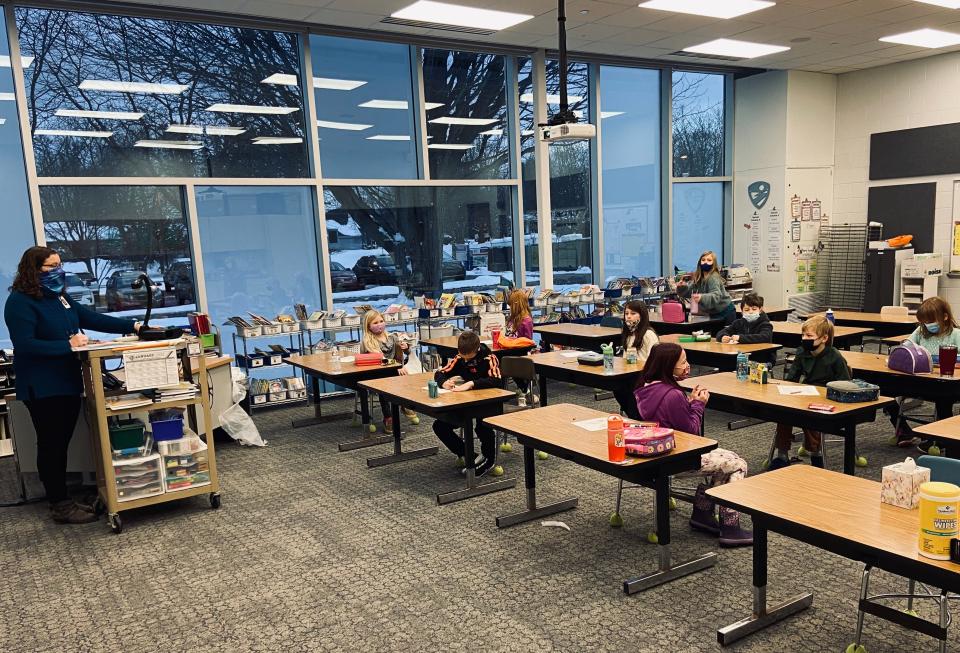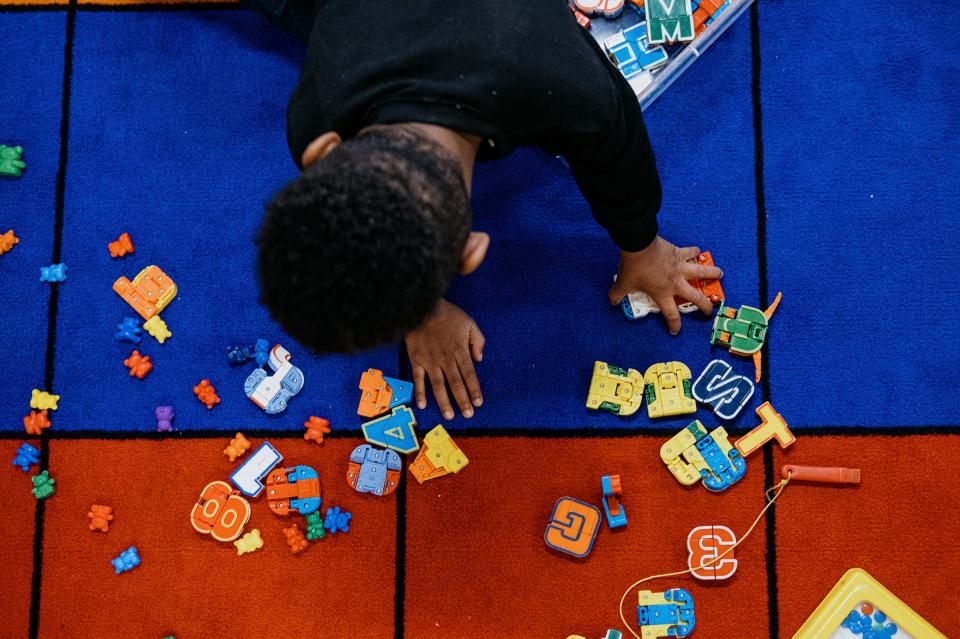School leaders appreciate Whitmer's proposals, but worry about implementation and staffing
- Oops!Something went wrong.Please try again later.
A pair of education initiatives proposed by Gov. Gretchen Whitmer during her recent State of the State are being seen by educators statewide as potential benefits — but with some questions on implementation.
Whitmer announced plans for expanded tutoring and free preschool during her speech Tuesday, Jan. 26.

The tutoring plan was initially proposed last year, but wasn't funded at the level Whitmer proposed — $280 million. The Republican-led legislature instead allocated $52 million.
While specifics haven't been released, the plan would provide tutoring for all grades and core subjects.
Tim Travis, superintendent of Saugatuck Public Schools in Allegan County, said more individual services for students is “a very effective strategy.” He also said providing schools flexibility with funding would help with implementation.
“We would like to have some flexibility to meet individual district needs and build on things in place, instead of being strictly mandated on how tutoring funds would be used,” he said. “We’re already doing individual tutoring during the school day in math and ELA. We could certainly use more expert tutors than what we have in the budget.”
Travis also mentioned a partnership with the Boys and Girls Club that provides extended opportunities after school. If schools are given flexibility to enhance tutoring, SPS could use their portion to strengthen tutoring services during that time.
Holland Public Schools Superintendent Nick Cassidy said he’s interested to see how the plan plays out — but looks forward to additional student support in general.

“We do have students who definitely need more support,” he said. “We have kids who have lost time from COVID or just personal struggles they’ve had since then. Any additional supports we can provide, I’m definitely on board with exploring those.”
Paul Clark, superintendent of Cheboygan Area Schools, says continuing to prioritize closing the learning gap is beneficial, though not unfamiliar. For the past two summers, the district has offered summer camps and summer school to help make up for learning loss. It plans to offer summer schooling again this year.
Following the pandemic, students from the Cheboygan-Otsego-Presque Isle Education Service District saw a decline in proficiency. The ESD serves 10 districts in Northern Michigan, including Cheboygan Area Schools, Gaylord Community Schools, Johannesburg-Lewiston Area Schools and Mackinaw City Public Schools.
According to MI School Data, for the 2021-2022 school year, 32 percent of third graders in the COPESD tested as not proficient on the M-STEP. In 2014-2015, only 25 percent tested as not proficient. In the Ottawa Area ISD, that number was 16.6. percent in 2021-22, up from 11.5 percent in 2014-15.
Fourth graders in the COPESD saw an even greater change, with 40 percent of all fourth-graders testing as not proficient last year. In 2014-2015, just 26 percent of students fell into the same category. Fourth-graders in the OAISD went from 14.9 percent not proficient in 2014-15 to 18.6 percent in 2021-22.
When it comes to offering after school tutoring options, Clark thinks the district could benefit from having one-on-one tutoring through the MI Kids Back on Track Program, though he's concerned about transportation.
“If the state is going to fund that program, I'm sure we will have teachers and other qualified people to take on the tutoring roles,” Clark said. “One concern would be transportation afterwards. Hopefully, the state will fund that as well. Some of our students who would benefit the most from tutoring might not be able to participate unless they had busing home."
Whitmer's preschool proposal would lift restrictions on Great Start Readiness Program eligibility, making it so every 4-year-old in the state can enroll over a rollout period of four years. Currently, families of four must make less than $70,000 per year or experience barriers such as homelessness to qualify.

Universal access to preschool could be a major benefit to school districts, and help families save on childcare costs.
“I don’t think anybody would argue the value that would bring,” Cassidy said. “I think having access to preschool is something that could significantly help close the gap between kids who struggle in school and those who don’t.”
“Universal preschool helps level the playing field for opportunity," Travis said.
In Cheboygan, preschool options are limited. Not all families qualify for reduced cost programs offered by the Northeast Michigan Community Service Agency, and other programs fill up quickly — leaving some families without care.
While most educators see both programs as beneficial on the surface, they come with one major obstacle — staffing. School districts already face challenges filling existing positions, and expanding tutoring and preschool offerings could add to the problem.
"The federal money from the pandemic will be gone soon and I hope that the state will continue to put education high on their priority list when developing the state budget," Clark said.
“An issue that we’ve had, even with tutoring and things we’ve held after school, it’s tough getting teachers to fit in another thing to plan and implement,” Cassidy said. “That’s a struggle we’ve faced the last few years as the workloads on teachers have increased."
Travis added a potential expansion of access to GSRP might be a good opportunity to look at compensation levels for those educators.
“With extra funding for preschool, maybe there’s an opportunity to compensate preschool teachers more appropriately and paraprofessionals more appropriately,” he said. “That will maybe help more students heading into college to take a look at education as a profession.”
— Contact reporter Karly Graham at kgraham@petoskeynews.com. Contact reporter Mitchell Boatman at mboatman@hollandsentinel.com.
This article originally appeared on The Holland Sentinel: School leaders appreciate Whitmer's proposals, but worry about implementation and staffing

